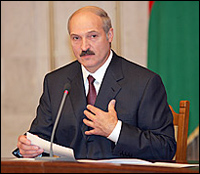Branded dictator, Alexander Lukashenko is deeply loved by many Belarusians
In his 71 years, Nikolai Azhenilok has never felt happier and more secure than under the rule of authoritarian President Alexander Lukashenko.

"Finally we are living 100 percent," the retiree says. "If they bring Lukashenko down, all is lost!"
Critics abroad and at home call Lukashenko who is widely predicted to win the Sunday presidential election a ruthless dictator and a tyrant, but to many citizens he is a dearly loved benefactor, the Batka (Father) as he likes to be called.
The popular support for Lukashenko, who has ruled this ex-Soviet republic of 10 million since 1994, is rooted in his skillful populism, the near-absence of independent news media and the country's history.
The 51-year-old former collective farm director appeals to many Belarusians as a common man who has risen through the ranks to fight for the interests of peasants and workers.
Independent polls estimate Lukashenko to have the support of some 60 percent of Belarusians.
State television endlessly shows Lukashenko touring the country, where he is seen milking cows, descending into coal mines and playing hockey. At one meeting with World War II veterans Lukashenko told them he shared their grief as the son of a soldier who had died in the war despite being born nearly 10 years after it was over.
State media also praise Lukashenko for turning Belarus into a stable and prosperous country against the backdrop of many ex-Soviet republics that are experiencing economic hardships and violent ethnic conflicts.
Such rhetoric plays well among many Belarusians, whose land was devastated in two world wars and previously had been contested in an array of conflicts. One in three Belarusians died in World War II and the nation has a history of yearning for peace and stability.
"All those grandmothers remember the war and when they see footage on television of schools that are being blown up and roofs collapsing they understand how important it is just to be safe," said independent analyst Yaroslav Romanchuk, referring to attacks and disasters in Russia.
Retirees such as Azhenilok and his wife Tatyana, 63, are grateful to Lukashenko for their pensions of about 250,000 Belarusian rubles (US$125, 103 euros) which are modest, but paid on time.
Unlike the Soviet-era shortages of consumer goods and economic hardships of the tumultuous early 1990s, the local grocery store in the village of Krynichny , some 280 kilometers (174 miles) southeast of the capital Minsk , now has plenty of goods to offer and the Azheniloks can afford them.
"There used to be no bread. Now there is everything: bread, wine vodka," Azhenilok said. Before Lukashenko, "we were going around without underpants."
Lukashenko has kept some 80 percent of the economy under state control, but despite criticism of centralized methods, Belarus' economy is on the way up, claiming a GDP growth of 6 to 9 percent annually in recent years.
Under Lukashenko, Krynichny has enjoyed a revival. It has been turned into an "agrogorodok" or agricultural town part of Lukashenko's program of building modern housing in villages in order to attract young workers to collective farms.
The government recently awarded Ivan, a 43-year-old worker, his wife and daughter one of the newly-built white brick houses in Krynichny. Ivan, who was reluctant to give his last name to a stranger for fear of attracting public attention, is deeply grateful to Lukashenko.
"With him we've begun living, I mean living a real life people are getting apartments, houses and there is food in the store," he said.
But analysts dismiss the agricultural towns project as merely a showcase undertaking. They say simply building housing for young workers without restructuring and reforming neighboring plants and collective farms and bringing in new technologies will not make the enterprises profitable.
Romanchuk said that without hefty Russian economic aid, Lukashenko could not have afforded to raise pensions and salaries, and that Belarus' Soviet-style economy could soon falter.
The Russian assistance is seen in cheap gas prices and the absence of customs duties for Belarusian exports to Russia. Critics also say liberalizing the economy and privatizing state enterprises which now constitute 80 percent of the economy would send billions of dollars in taxes and foreign investment into state coffers.
But with media under tight government control, there is scarce criticism of Lukashenko on those issues, with many Belarusians sincerely believing in the success of their leader.
"We won't let anyone pour dirt on our Batka!" Tatyana Azhenilok exclaimed, reports the AP.
D.M.
Subscribe to Pravda.Ru Telegram channel, Facebook, RSS!


